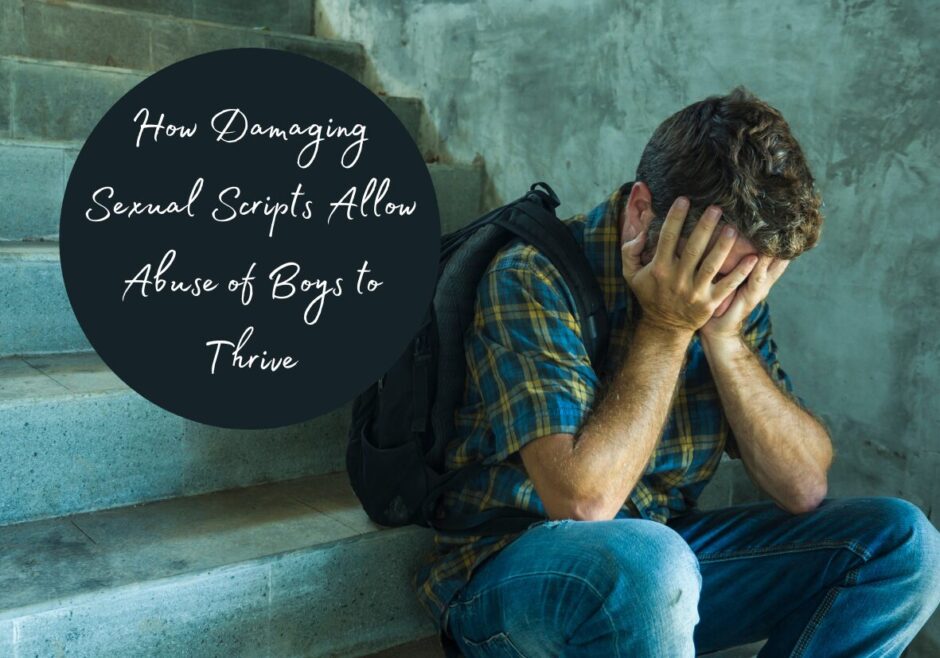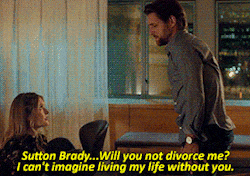Today’s post by Poly Lone Ranger, AKA James Mosley II (he/him), is an important topic that isn’t talked about anywhere near enough. Heads-up that this one comes with a trigger warning for abuse, rape, and sexual violence. It also discusses sexual scripts and the limiting, gendered, and cisheteronormative societal ideals around sex, bodies, and consent.
Amy x
How Damaging Sexual Scripts Allow Abuse of “Lucky Boys” to Thrive by Poly Lone Ranger
It’s Friday night, and I’m lounging in my room with a beer, fully engrossed in the TV miniseries A Teacher (currently on Hulu). For those who haven’t seen it, the show stars Kate Mara as Claire Wilson, a newly appointed AP high school teacher in her early 30s, and Nick Robinson as Eric Walker, Claire’s 17-year-old student on the cusp of college. What starts as Claire tutoring Eric for the SATs soon turns into an inappropriate intimate relationship between teacher and student.
As I watched, I noticed myself experiencing arousal during Eric and Claire’s interactions—a super unsettling reaction that made me think on how much cultural narratives shape our sexual responses, even when we intellectually recognize something as abusive. So I asked myself why. Why would I feel this way knowing what I was watching was an abuse narrative—a young boy being taken advantage of by someone in power?
Digging deeper, I came across BSc psychology grad Charlotte Houghton’s study Addressing Gender Bias in the Narrative of Teacher-Student Sexual Crimes [2]. Houghton calls out this trope: “Media coverage often portrays abusive female teachers as participants in ‘love affairs’ or ‘romances’ rather than categorizing them as sexual predators, as male teachers are typically labelled.”
That hit me hard. The same thing occurs with pornographic scenes and cultural conditioning. Maybe I wasn’t fantasizing freely on my own, but repeating what society had taught me to see as “desirable” and, in some minds, acceptable.
Why It Matters
According to the CDC as of 2025, one in 20 boys in the U.S. experiences child sexual abuse before adulthood [1]. Yet male victimization is immensely underreported because cultural norms discourage boys and men from seeing themselves as victims of sexual violence.
While most people correctly recognize sexual contact between an adult and a minor as abuse, society often reacts more leniently when the predator is a woman and the victim is a young boy. Dr. Houghton further notes that public perception of adult male teacher/minor female student abuse is overwhelmingly negative, but adult female teacher/minor male student cases are often romanticized or even outright eroticized.
Boys are handed scripts from a young age about what being a man means. These scripts come from the media, family, and peers. These narratives become instructions for how men “should” act in intimate and sexual scenarios, often erasing the acknowledgement of consent, emotional awareness, vulnerability, and the possibility of victimhood.
Let’s unpack seven common sexual scripts that disguise abuse as a normal or even desirable part of male development, silencing young boys while protecting predators.
What Are Sexual Scripts?
So what are sexual scripts? Sexual scripts, a term coined by sociologists John H. Gagnon and William Simon [6] and later expanded by N. Tatiana Masters, Erin Casey, Elizabeth Wells, and Diane Morrison [3], are social manuals teaching people how to conduct themselves intimately and/or sexually. These scripts become performed out on the world stage and are usually enacted subconsciously.
Masters’ study Sexual Scripts Among Young Heterosexually Active Men and Women: Continuity and Change [3] outlines some common male scripts: always desiring sex, initiating it, having strong “sex drives,” being skilled lovers, prioritizing sex over emotional connections, and seeking multiple partners.
Below are seven sexual scripts that help abuse of boys flourish:
- Men should always be ready and willing for sex
- Men should always initiate sex
- Masculinity is synonymous with sexual conquest
- Men are supposed to be dominant and in control
- Men must be skilled lovers naturally
- Men should prioritize penetration and orgasm
- Men shouldn’t show emotional intimacy or vulnerability during sex
Script 1: Men Should Always Be Ready and Willing
The assumption that men should always want sex disregards the requirement for them to consent to sex each time. Mark Travers, Ph.D., in Are Men Always Ready & Willing To Have Sex? [7] found that 61% of men reported “mild sexual compliance” in the past year. That is, they said yes to unwanted sexual activity simply because it was expected.
When boys internalize this script, they become easy targets. A teenage boy “going along” with an older woman’s advances may believe he consented, even when his gut said no. Predators can frame abuse as harmless or even generous: she “gave him” a sexual experience he was supposedly lucky to have.
This script primes boys to misinterpret coercion as a natural expectation, and ignores the very power imbalances that enable and normalize abuse.
Script 2: Men Should Always Initiate
From evolutionary “hunter” myths to contemporary media portrayals, boys are told they should pursue and chase everything sexual. When an older woman initiates, the taboo can feel erotic rather than predatory, at least on the surface.
Grooming often disguises itself as a choice. A boy may feel he “chose” the relationship, when in reality he was carefully steered by his abuser. Because society casts men as pursuers, young male victims may convince themselves they always had agency in the dynamic.
This script reinforces the idea that boys can be complicit in their own abuse.
Script 3: Masculinity is Synonymous with Sexual Conquest
When I was in middle school and high school, having sex was the ultimate status symbol among boys. Counting sexual partners became a toxic but common pastime. Masters’ study cites Ethan, a young man who felt it was his “mission” to have sex with “as many girls as I can,” even though it left him feeling unsatisfied. I’ve been there myself.
When masculinity is measured by the number of sexual partners (especially female partners), boys can even be pushed to count sex with a female predator as an accomplishment instead of harmful. Abuse becomes viewed as a trophy rather than a trauma.
Script 4: Men Are Supposed to Be Dominant and in Control
Societal narratives about masculinity conflate it with dominance. The National Sexual Violence Resource Center (NSVRC) notes: “male survivors struggle to label abuse as abuse because vulnerability doesn’t
fit the dominant male role” [4]
Boys may interpret sex with an older woman as “being chosen” or “having power”, or “being the man” (as Eric Walker repeatedly says in A Teacher) as even when the power imbalance is stacked against them.
Sexual scripts that reinforce the idea of being a man alongside “dominance” prevents boys from acknowledging when they are in a situation in which they are overpowered or in danger, normalizing abuse under the guise of masculinity.
Script 5: Men Must Be Skilled Lovers Naturally
From medieval chivalry to modern porn, men are told they should already “know” how to perform sexually. This social expectation leaves no room for learning, confusion, or boundaries.
Boys may believe they naturally have components of intimacy such as consent figured out when they don’t. If an older woman initiates, the boy assumes he’s supposed to rise to the occasion and “perform”. He judges himself on skill instead of reflecting on his short life experience and giving himself space to learn, grow, and get to know himself.
Scripts that enforce performance over agency contribute directly to silenced boy victims.
Script 6: Men Should Prioritize Penetration and Orgasm
This script reduces sex to mechanics. Emotional impact and consent barely factor in.
Research on male sexual assault mentions that men often experience erections or ejaculation during assault. NSVRC adds, “Some men may question that sexual assault could have happened if part of it was enjoyable, or if they became physically aroused” [4].
Physical response isn’t consent. Scripts equating orgasm with pleasure or consent dismiss boys’ abuse as enjoyment, enabling predators.
Script 7: Men Shouldn’t Show Emotional Intimacy or Vulnerability
John Wayne. Gary Cooper. Clint Eastwood. From toxically masculine figures in film to emotionally shut-down fathers, boys are often taught, “don’t cry, don’t feel.” Vulnerability during sex is especially off-limits.
NSVRC explains: “men may feel the need to be silent about their abuse because of the internalized belief that men can’t be victims, or that men should not express weakness” [4].
If an older person crosses a line, there is little space for boys to process trauma. They may brag to peers or stay silent—both strategies that bury real harm. Scripts that enforce emotional suppression keep abuse
hidden and unacknowledged.
Sexual Scripts, Abuse, and a Cultural Double Standard
Reactions to abuse differ starkly by gender. Comment sections of headlines online describing female teacher/male student abuse are full of men saying, “where was she when I was in high school?!” While passed off as jokes such remarks excuse predators and erase boys’ victimhood.
Australian and U.S. studies of Facebook comments executed by Kristan Russell, Ph.D. confirm this: attractive female predators are often excused as “pretty women,” while male victims are framed as “lucky blokes” [5].
In Dr. Russell’s study participants read newspaper articles describing a case of a local teacher who engaged in sexual misconduct with a 17-year-old student. When the scenario was an adult female teacher and underage male student, the relationship was viewed to be less harmful to the student, the student to be more mature and responsible, and the relationship to be more acceptable. Society’s double standard hides abuse and shields perpetrators.
Real-World Consequences
These scripts don’t just warp perception. They leave deep scars. Male survivors of childhood sexual abuse face a higher risk of depression, anxiety, intimacy struggles, and substance abuse. Many disclose their experiences only decades later, if ever.
Society’s insistence that boys “enjoyed it” or were “lucky” leads survivors to gaslight themselves, misinterpreting abuse as consensual. Without validation, trauma festers, negatively impacting relationships, self-worth, and mental health.
Beyond Sexual Scripts: What Can We Do About It?
Now the good news is that sexual scripts aren’t permanent. Since they were learned, they can be unlearned.
First we must shift how we view offenses and stop romanticizing and/or eroticizing young male victimization, especially when the abuser is attractive and female. The “lucky boy” narrative isn’t harmless—it shields abuse.
If we want boys to speak up without shame, we must challenge these scripts. Male victimhood is as real and deserving of compassion as female victimhood. Boys who experience abuse deserve protection, recognition, and empathy. Anything less ensures the abuse continues. Until we rewrite these scripts, abuse will continue to hide in plain sight.
Sources & Further Reading
[1] Centers for Disease Control and Prevention. (2024, May 16). About child sexual abuse.
National Center for Injury Prevention and Control.
[2] Houghton, C. (2024, March 14). Gender bias in teacher-student sexual crimes. The
Academic. Retrieved August 21, 2025
[3] Masters, N. T., Casey, E., Wells, E. A., & Morrison, D. M. (2013). Sexual scripts among
young heterosexually active men and women: Continuity and change. Journal of Sex
Research, 50(5), 409–420.
[4] National Sexual Violence Resource Center. (n.d.). Understanding male socialization,
stigma, and reactions to sexual violence. National Sexual Violence Resource Center. Retrieved August 21, 2025
[5] Prairie View A&M University. (2021, April 26). Study: Teachers’ gender, sexuality, age
affect perceptions of sexual misconduct of students. Prairie View A&M University.
Retrieved August 21, 2025
[6] Gagnon, J. H., & Simon, W. (1973). Sexual conduct: The social sources of human
sexuality. Aldine Publishing Company.
[7] Travers, M. (2022, May 7). Are men always ready and willing to have sex?
Therapytips.org. Retrieved August 21, 2025
[8] Thomas, J. C., & Kopel, J. (2023). Male victims of sexual assault: A review of the
literature. Behavioral Sciences, 13(4), 304.
About the Writer
James Mosley II, AKA Poly Lone Ranger, is a writer, aspiring sexuality educator & researcher, and a current graduate student at Widener University, where he’s earning his M.Ed in Human Sexuality. He is passionate about non-monogamy, robust sex education, and helping others find and accept their most authentic selves in the realm of sexuality. James is the author of the children’s coloring book, “Coloring Connection VOL 1.” You can find more of his projects at https://beacons.ai/polyloneranger.












